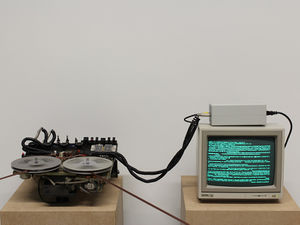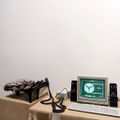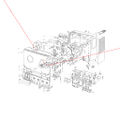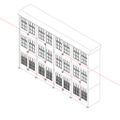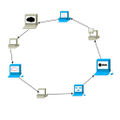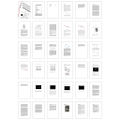RRTRN: Difference between revisions
No edit summary |
No edit summary |
||
| Line 12: | Line 12: | ||
Since the rise of information theory we know that the processing of a signal always results in loss, there is always an element of friction. In the <nowiki>[RRTRN]</nowiki> three terminals are connected together via a single tape loop. Each terminal consists of a modified reel-to-reel tape deck and a computational work-station running a simple messaging program. Every message that a user on the terminal writes, will be modulated into sound, recorded on the tape and sent(=rolled) to the other terminals. There the received audio signal will be demodulated back into the message and it appears on the screen. By its particular setup the installation is classed in an unusual ring network topology, where information flows counter-clockwise.<nowiki>[RRTRN]</nowiki> deals with the materialisation of networks and reveals hidden technological layers and deals with contingency in the development of technology by considering media of the past and imagining different uses. | Since the rise of information theory we know that the processing of a signal always results in loss, there is always an element of friction. In the <nowiki>[RRTRN]</nowiki> three terminals are connected together via a single tape loop. Each terminal consists of a modified reel-to-reel tape deck and a computational work-station running a simple messaging program. Every message that a user on the terminal writes, will be modulated into sound, recorded on the tape and sent(=rolled) to the other terminals. There the received audio signal will be demodulated back into the message and it appears on the screen. By its particular setup the installation is classed in an unusual ring network topology, where information flows counter-clockwise.<nowiki>[RRTRN]</nowiki> deals with the materialisation of networks and reveals hidden technological layers and deals with contingency in the development of technology by considering media of the past and imagining different uses. | ||
<gallery> | |||
File:Rrtrnweb1.JPG|Terminal | |||
File:Rrtrnweb2.JPG|Tape deck | |||
File:Rrtrnweb3.JPG|Tape deck | |||
File:Rrtrnweb4.JPG|Example house <nowiki>[RRTRN]</nowiki> | |||
File:Rrtrnweb5.JPG|Ring topology | |||
File:Rrtrnweb6.JPG|Overview operation manual | |||
</gallery> | |||
Revision as of 11:30, 13 February 2017
| RRTRN | |
|---|---|
| Creator | Joseph Knierzinger |
| Year | 2015 |
| Bio | Joseph Knierzinger[AT] grew up in a circus and is a trained banker, artist and dilettantish engineer. His artistic output is between installation, intervention, wearable instruments and performances. In his work he explores obsolete media and the implementation of it into our here and now, as well as the mechanisation of the non-sense. Currently he manages his presence between Rotterdam and Vienna. |
| Thumbnail | |
| Website | http://joak.nospace.at |
The real-reel-to-reel-network[RRTRN] is a media archaeological platform that represents an investigation into a fictional, part electronic, part acoustic and part mechanical network and storage system.
Since the rise of information theory we know that the processing of a signal always results in loss, there is always an element of friction. In the [RRTRN] three terminals are connected together via a single tape loop. Each terminal consists of a modified reel-to-reel tape deck and a computational work-station running a simple messaging program. Every message that a user on the terminal writes, will be modulated into sound, recorded on the tape and sent(=rolled) to the other terminals. There the received audio signal will be demodulated back into the message and it appears on the screen. By its particular setup the installation is classed in an unusual ring network topology, where information flows counter-clockwise.[RRTRN] deals with the materialisation of networks and reveals hidden technological layers and deals with contingency in the development of technology by considering media of the past and imagining different uses.

